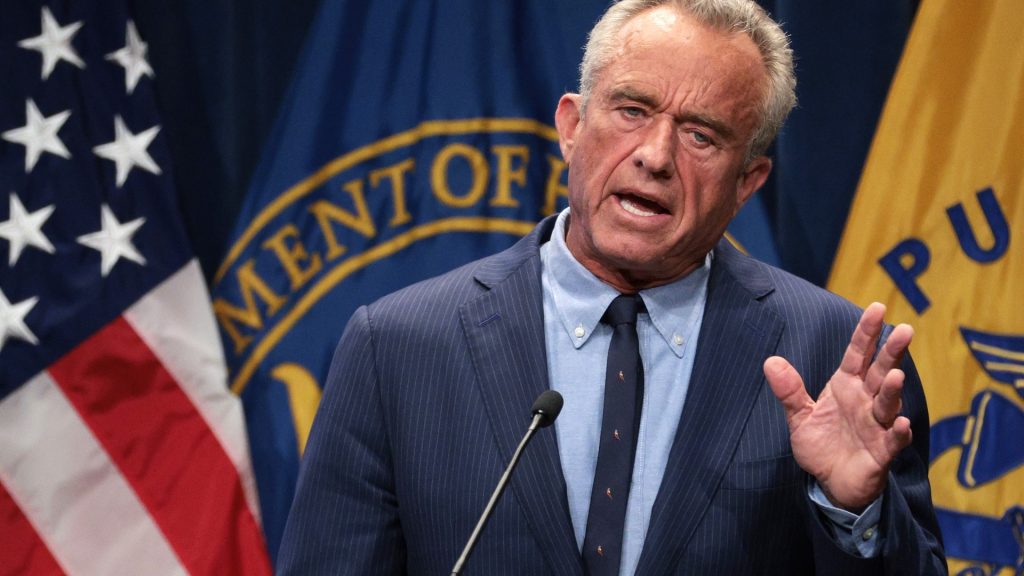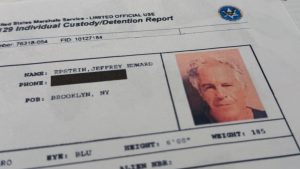Former federal health workers concerned about where RFK gets his information

Former federal health officials say they’re concerned about the information sources relied on by Health and Human Services Sec. Robert F. Kennedy Jr. as he guides the nation’s approach to disease prevention and response. In interviews with Straight Arrow News, scientists and other former officials raised questions about Kennedy’s public statements on numerous topics, including vaccinations, autism, measles and more.
SAN spoke to seven former federal health officials who have left their jobs since Kennedy took charge. Some requested anonymity because they feared professional attribution.
Interviewed separately, they expressed grave concerns about Kennedy’s impact on public health, saying he relies on unsound scientific theories, disregards expert findings and dispenses poorly conceived and even dangerous medical advice as he focuses more on chronic illnesses than on the potential for widespread outbreaks like another pandemic.
“I think that the average American citizen should be very concerned, because infectious diseases are very much still with us,” said Dr. Peter Marks, a former Food and Drug Administration official who resigned earlier this year. “You can’t take a break from infectious diseases. That’s just not the case, and our great nation is capable of handling infectious diseases and chronic diseases at the same time. OK, we can walk and chew gum at the same time.”
HHS responded to SAN with a statement.
“In his hearing, Secretary Kennedy directly refuted claims that he has never been briefed by career CDC officials,” Emily Hilliard, press secretary for HHS, told SAN. “The Secretary is committed to evidence-based science. It’s why, in just seven months, he and the HHS team have accomplished more than any health secretary in history in the fight to end the country’s chronic disease epidemic and Make America Healthy Again.”
Kennedy’s office refused an interview request. Kennedy has defended his approach to public health, saying he would let scientific professionals in HHS do their jobs.
“I am not going to go into HHS and impose my preordained opinions on anybody at HHS,” Kennedy said at his Senate confirmation hearing in January. “I’m going to empower the scientists at HHS to do their job and make sure that we have good science that’s evidence-based, that’s replicable, where the raw data is published.”
Lack of briefings
The Department of Health and Human Services oversees more than a dozen agencies, including the Centers for Disease Control (CDC), the National Institutes of Health (NIH), the Food and Drug Administration (FDA) and the Administration for Strategic Preparedness and Response (ASPR).
Former employees interviewed by SAN said it was common for past secretaries to meet with agency leaders for briefings, especially on trending topics.
“If it was a topical priority, they would receive a briefing,” Dr. Deb Houry, a former chief medical officer of CDC who resigned in August, told SAN. “Certainly, if it was an outbreak, they would then get more regular briefings.”
Despite ongoing outbreaks of measles, COVID-19 variants and bird flu, officials whom SAN spoke with said Kennedy had received limited briefings on other subjects.
“My understanding is that he had one briefing on Lyme disease and then otherwise, had no interaction with any experts in the infectious disease areas of CDC,” Dr. Demetre Daskalakis, who resigned from a top role in the CDC earlier this year, told SAN. “Completely abnormal.”
Daskalakis said Kennedy met with one CDC scientist about vaccines, but that worker did not actually work on vaccine programs with the most current information.
“[It’s] like the secretary of defense calling someone in the Department of the Interior about something that’s defense related,” Daskalakis said.
A former ASPR leader who resigned earlier this year was aware only of meetings on other topics including as part of the Secretary’s Operations Center, or SOC. That serves as the focal point for the federal public health and medical response
“ASPR traditionally runs that meeting,” the former official told SAN. “But it was about hurricanes and weather patterns and just about sort of how that operation center is supposed to work. No scientific experts were invited to that meeting.”
Houry said this wasn’t the case during the first Trump administration, when HHS was led first by Tom Price, a physician and former congressman, and then by Alex Azar, a lawyer who had once been the agency’s general counsel.
“Under the prior Trump administration, CDC functioned quite well,” Houry said. “I was there, and we had a great relationship with the secretary. There were regular briefings. Currently, the secretary is not getting briefings from any senior career scientist leaders at the CDC.”
The former ASPR leader agreed the lack of regular briefings was not typical under past administrations.
“We would have weekly meetings, or sometimes more often, depending on if we were in a state of active cases of a particular disease response,” the former ASPR employee said. “CDC would be on those calls, and NIH leadership would be on those calls, across the agencies. They would get the expertise. But none of that was happening under this administration.”
A former FDA senior official told SAN that the FDA commissioner met weekly with former Secretary Xavier Becerra, who led HHS during the Biden administration.
‘No desire for a discussion’
Marks’ departure earlier this year was one of the more high-profile resignations. As head of the agency’s Center for Biologics Evaluation and Research, he oversaw regulation of vaccines, gene therapies, blood products and tissue-based therapies.
Marks told SAN he attempted to contact Kennedy’s office about vaccinations. Before his appointment, Kennedy was a prominent vaccine critic who had amplified widely debunked claims that an ingredient in some vaccines caused autism.
“What was surprising to me was that he had a particular interest in vaccines, which are Center handled,” Marks said. “And I tried to contact him through memos about trying to address some of his concerns that I heard through his staff members and there was no desire for a discussion of any of the proposals.”
Marks wasn’t the only one who said they tried to get in contact with Kennedy or his team.
“In the middle of the measles outbreak, we offered to brief the secretary before the changes to the vaccine committee,” Houry said. “We offered to brief the secretary when he came onboard, we offered to brief him on H5N1. Those are the things that would give me confidence that the secretary is getting appropriate advice.”
Where Kennedy gets his info
So where is Kennedy getting his advice and information?
The former NIH official told SAN that Kennedy likely hears about that agency and certain vaccinations from Dr. Matthew Memoli, the principal deputy director of NIH.
Memoli previously served as the NIH’s acting director for several months.
Prior to serving as Acting Director, Memoli spent nearly two decades working with an influenza research lab. The former official said Memoli made “quite a leap” from that role to acting director.
“He would be like a lieutenant becoming an acting secretary of defense,” the former NIH official said.
Memoli was vocally critical of vaccine mandates during the COVID-19 pandemic. And, like many prominent conservatives, he criticized former NIH Director Dr. Anthony Fauci. Some of the former HHS officials interviewed by SAN said Memoli’s outspokenness could explain his rapid ascent when Trump returned to office.
“He worked for Tony Fauci, and Fauci, you know, obviously supported mandates, and the federal government had a mandate for federal employees,” the former NIH official said. “And Memoli was like, ‘No.’ So, he became immediately a darling of the right wing during the early months of COVID.”
That official specifically pointed to an April announcement from Kennedy in which the secretary suggested single-antigen vaccines do not work.
Those vaccines target a sole part of a pathogen and have been successfully used as early as 1796.
One month later, Kennedy shifted $500 million from a pandemic preparedness fund to a vaccine development program led by Memoli and another employee, that focuses on multi-antigen vaccines.
“It’s wrong to trash any kind of research before it’s done, so I’m not going to, either, but I think the amount of money funneled to it is disproportionate,” the former NIH official said. “The other thing is, in the meantime, a lot of other vaccine research has been canceled.”
Memoli did not respond to a request for an interview. Other former officials, including Marks, suggested Kennedy relies on information from the nonprofit Children’s Health Defense, which he has chaired. The organization has filed dozens of lawsuits challenging vaccination and public health mandates.
In addition, Daskalakis said Kennedy is close to Dr. Robert Malone, a researcher who claimed the severity of COVID-19 was overblown, even as it killed more than 1 million Americans, and promoted disproven theories that the coronavirus vaccine was unsafe.
Daskalakis and other career health professionals said Kennedy seems to be setting health care policy based on tweets, not research from his own department.
“I learned over the course of my time that if I looked at the Children’s Health Defense X account, Robert Malone’s X account, and a couple of other folks who are, historically, not very interested in supporting vaccination … I would then know what the next thing was going to be that he was going to talk about,” Daskalakis said.
For instance, Children’s Health Defense’s X account mentioned “bird flu” at least a dozen times in the months before Kennedy proposed letting the virus spread through commercial flocks rather than trying to contain it.
Meanwhile, Kennedy appointed Malone to a vaccine advisory board despite his history of controversial views — including that COVID-19 vaccines cause a form of AIDS.
Daskalakis said he was “highly concerned” that Kennedy seemed to be listening “to only people who are conspiracy theorists.”
“Americans should be concerned that as CDC gets more and more silenced, not able to speak, if the only voice is Secretary Kennedy’s and he’s getting his information from conspiracy theorists and people who are seemingly going to get financial or personal gain out of destabilizing public health in America, then that means that their health is at risk,” Daskalakis said.
Former officials point to Kennedy’s decision to wind down mRNA vaccine development — widely cited for creating a highly effective coronavirus vaccine — under the Biomedical Advanced Research and Development Authority (BARDA).
“RFK is sitting there saying the experts at BARDA have told me that these mRNA vaccines are dangerous,” the former ASPR leader said. “Complete falsehood, right? Not one of them was consulted, nor would they have ever said that, because there’s no way any of them would have agreed to be funding them if they were putting people in danger.”
That former worker continued on saying the whole thing contradicts itself.
“He’s saying this, and at the same time, they’re still approved by the FDA, which is also under his jurisdiction,” the former ASPR employee said. “So how can those two things both be true? Like, either they are dangerous and get them the hell off the market, or they’re not dangerous and stop saying it to the American people.”
The former top FDA official said when it comes to the food space, he sees Kennedy getting information from a group of advisers coming out of the Make America Healthy Again initiative. But that former official warned they’re not actually FDA scientists.
“They’re political appointees in the FDA,” the former FDA official said.
Politicization of agencies
The former officials told SAN that Kennedy has politicized federal health agencies, which traditionally have been nonpartisan and impartial.
“People at CDC, FDA, people were there for the people of the United States,” Marks said. “… We were there for getting to the truth of what was going on.”
In the past, only agency heads were political appointees. Others were career officials who worked under multiple administrations, regardless of political party.
“The FDA had very few political appointees,” the former FDA senior official said. “Historically, there were, I think, only three when I was there. Now the person who has my former job is a political appointee. The commissioner’s office has a number of political appointees, and there are certainly more than three.”
At the NIH, agency leaders announced in September they had appointed Michael Allen as the new chief operating officer of the National Institute of Allergy and Infectious Diseases, a newly created position. He is one of only two officials listed on the institute’s senior leadership page without a biography. His background is unclear.
“It’s totally new,” that former NIH official said. “It’s their effort to have political tentacles at lower levels.”
As HHS became more politicized, the former officials said, Kennedy made decisions without consulting staff members with scientific expertise.
“I find out what my day is going to be like from The Washington Post or from The Wall Street Journal,” the former ASPR employee said. “My secretary-level leadership is talking to the newspaper, but not talking to the head of my agency, and certainly not talking to the people who have to operationalize whatever it is they’re saying.”
For instance, in March, Kennedy publicly promoted vitamin A as a means of containing a measles outbreak, saying HHS would provide the vitamin to highly impacted areas.
“Then we’re getting phone calls like ‘Where is it, how much?’” the former ASPR employee said. “And we’re like, ‘We don’t even know what you’re talking about.’”
Kennedy press briefings
“I don’t think people should be taking medical advice from me,” Kennedy said during a House hearing in May.
Nevertheless, Kennedy has held several press briefings this year to share information he believes to be relevant. That includes recommending that pregnant women avoid Tylenol over autism concerns and the shift in vaccination funding. British researchers reported last week that no credible studies had established a link between acetaminophen, the active ingredient in Tylenol, and autism or other neurological conditions.
“A well-briefed secretary is actually able to provide advice to people around their health,” Daskalakis said. “So, I disagree with the general statement that you shouldn’t take medical advice from him. I think that you shouldn’t take medical advice from him because he’s not listening to anybody who actually has experience or and knowledge.”
The former health officials said they continue to watch Kennedy’s press briefings and often find themselves unclear on where he got the information he’s sharing with the American public.
“It’s an acceptance that we have decided that we don’t care any more about facts and the truth in the United States,” Marks said. “Public health does not seem to be a priority anymore, true public health. Because what we’re doing here has no semblance to what public health should be about.”
The former ASPR employee said it can be frustrating watching the briefings.
“There is zero transparency,” the former ASPR employee said. “We have no idea — even their own staff doesn’t know how these decisions are being made or based on what evidence. And then they say, ‘Oh, but look, we published all these citations,’ and none of those citations support what they say.”
Kennedy released a Make America Healthy Again report earlier this year that prescribed solutions to the obesity crisis, calling it “gold standard” science with more than 500 citations. However, at least seven of those include reference to studies that never happened and others that researchers say were mischaracterized.
“I would love to work on that,” the former ASPR employee said about the report. “But then it’s like, he’s coming back home, and he’s cutting all the experts who could help with that program, and he’s cutting all the funding to support that program, and he’s cutting the entire office that would actually be able to inform on that program.”
Kennedy has also threatened to bar government scientists from publishing in top medical journals, claiming they are “corrupt” and influenced by pharmaceutical companies.
“The hardest part is that we’re constantly under fire for being conflicted,” Marks said. “You know, ‘You’re conflicted. You’re in the pocket of industry. You’re in the pocket of this, that, and the other thing.’ And nothing could be further from the truth.”
Following his departure, Marks took a job with the pharmaceutical company Eli Lilly, which defended the hiring. Marks said it was his only option after having trouble getting work in public health following his public departure from the FDA.
What Kennedy has said
During his Senate confirmation hearing, Kennedy was asked about having “anti-science views.”
“I have always been a science person, a pro-science person,” Kennedy said. “I believe in evidence-based medicine and gold standard science.”
He also repeatedly said there should be more transparency within the agencies that make up HHS.
“We should make sure that all the science is published with the raw data,” Kennedy said. “We should make sure that the peer reviews are also published.”
In press conferences, Kennedy often mentions the agencies he oversees and refers to peer-reviewed studies. However, he does not always name the study or data he’s referring to.
“At President Trump’s urging, NIH, FDA, CDC, and CMS are turning over every stone to identify the ideology of the autism epidemic and how patients and parents can prevent and reverse this alarming trend,” Kennedy said at the press conference in which he pushed for pregnant women to avoid taking acetaminophen. None of those agencies had linked Tylenol to autism.
What it means for you
The former health officials interviewed by SAN said Kennedy’s approach to running HHS is inherently dangerous.
Former CDC officials stressed the importance of the HHS secretary, no matter who they are.
“Very often the person who’s in charge of health is not a physician, nor do they necessarily have extensive experience in public health,” Daskalakis said. “They tend to be people who know how to navigate political environments and also generally know how to run an organization. So, in the scenario where you have someone who’s not an expert in public health, what’s really important is that you present the data that you have around whatever the subject is.”
The HHS secretary sets certain health policies that can be important to public health and many of those get decided during briefings.
“It heavily informed what was going to happen,” another former NIH official said. “Ultimately the political people are the ones who make decisions, and as I told people for 25 years, as long as it’s not immoral or illegal, you have to deliver what they tell you to do.”
Most of the concern expressed by former officials was over the nation being unprepared for the next major health event — the next coronavirus pandemic or major flu outbreak.
“These are things that I think the American public as well as Congress really needs to pay attention to,” Houry said.
“If you’re not prepared with the surveillance that CDC does, or the rapid research that NIH does, or the regulatory prowess that FDA can put on top of all of this, like we did with Operation Warp Speed,” Marks said, “if you’re not prepared, we could be at risk of having more people die in this country of an infectious disease needlessly because we weren’t ready for it.”
The post Former federal health workers concerned about where RFK gets his information appeared first on Straight Arrow News.





